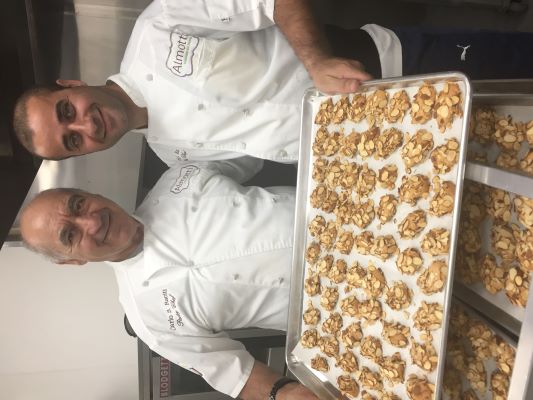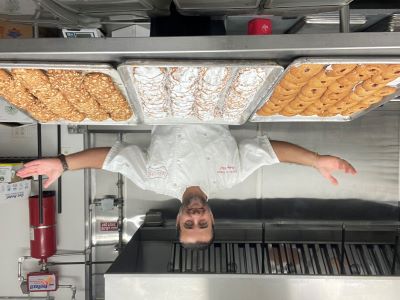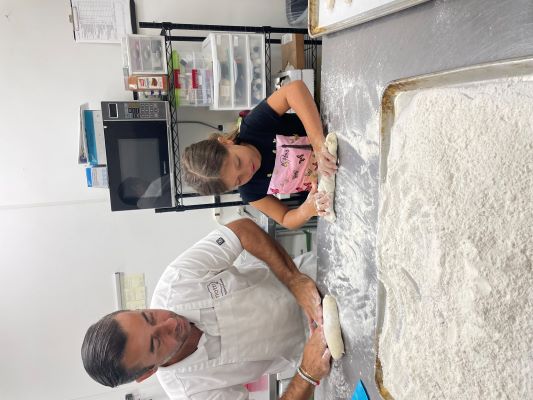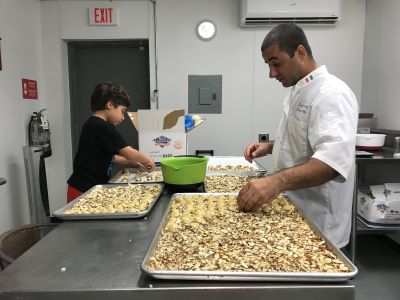For more than 20 years, Melissa Sepulveda enjoyed a photography career. She took family portraits and provided shots for the advertising department of a high-end handbag company. But everything changed on Mother’s Day weekend of 2019 when she learned she had breast cancer.
She chose not to share this news with her mother, who was not feeling well, even after scheduling an August mastectomy. As it turned out, her mother was hospitalized in July, a stay that lasted until September. Melissa had her operation on a separate floor in the same hospital wing, but still, she kept her diagnosis from her mother. She knew it would make things more difficult.
After she was discharged from the hospital, Melissa spent two weeks recovering before returning to her mother’s bedside, where she spent her mother’s final days on the pull-out chair until her mother passed on September 16. She was devastated, exhausted from her own recovery, and struggling to make sense of what life looked like without her mother. Her father was already gone.
Melissa turned 50 that December and decided that after such a harrowing spring, summer, and fall, she needed to celebrate. She held a holiday open house without telling anyone it was her birthday—just an opportunity to have fun, relax, laugh, and sing together.
One of her friends gave her a book called Baking Bread for Beginners. The two had fantasized about opening a cafe.
Melissa didn’t open the book until January, when she made her first loaf of bread. As she kneaded the dough, she was struck by its texture, which, funnily, reminded her of her mother and grandmother.

Working with dough reminds Melissa of her mother and grandmother.
“My mother and grandmother both had very soft upper arms, and as kids, my cousins, siblings, and I loved holding on to those arms,” Melissa remembers. “We would call them dough arms, which is what that dough felt like.”
Kneading it was therapeutic, as was the smell of the yeast, which brought her back to her Sicilian grandmother’s kitchen. From then on, she couldn’t stop baking.
Today, as the owner of Forno Bakery in Wareham, Massachusetts, on the southern outskirts of Greater Boston, Melissa bakes and sells breads, cannoli, quiches, focaccia, fonuts (a hybrid of a donut and focaccia), and more.
We discussed her influences and how she took her baking from personal therapy to a community-oriented business. She shared her challenges, goals, and what she hopes to deliver.

Forno Bakery loaves
How did your grandmother influence your passion for baking?
I consider myself a generationally taught baker, because it's nothing that you can learn in school, or you can learn from a book. It's really your hands-on experience. It was with my grandmother as soon as I could hold some dough. Without knowing it, I was experiencing what that texture felt like, and I liked to feel that.
I remember distinctly loving the smell of yeast at a very early age. Some people are kind of offended by it, but those two things really resonate with me.
When I bake now, it's different. It's a feel. It isn't just in my hands. It's almost meditative. It's extremely therapeutic and comforting because I'm returning to my grandmother and mother, who made things differently.
My grandmother loved to take the time, and she could embroider. She was very, very talented and very creative. When she passed away, we found all these little scraps of paper with different ingredients written on them randomly around her kitchen. They were notes for herself about something she was working on or something she had added as she was baking or making whatever it was. We just realized at that point just how smart she was with very limited resources.
You have to think about how she arrived on Ellis Island with her little sister in the early 1900s. She was nine years old, one of many children, and a lot of them were still back in Italy. When they came over, she actually had conjunctivitis, so she was separated from her mother when they landed.
My mom and I went to New York and visited Ellis Island, and just to imagine that my grandmother walked through there… It wasn't just a setup of chairs and suitcases off to the side. She couldn't speak English and was being separated from her mother in a different country.
She was a child and did not know what was happening. I can't imagine the fear or the anxiety that she must have felt during that time. The next day, she was reunited with her mother, but the idea of that made me so emotional as I stood in that building.
Eventually, all the other family members slowly came over, and everyone was here in Massachusetts. They started in Mansfield, Massachusetts, and then ended up in Quincy, Massachusetts.

Melissa's grandmother's home in Sicily
My grandmother met my grandfather and married when she was 16. She made her wedding dress, which is just so beautiful. Her sister used to create a Maypole like the one they use for the May Day celebration. She would make paper dresses for all of the girls. You would not even know that they were paper—the craftsmanship, the detail, and all that were so relevant.
I grew up with her. She and her sister were very close, and her sister married my grandmother's husband's brother. So we were so interconnected with this huge family.
I'd watch my aunt crochet, and my grandmother embroider, bake, make things, and just go about her day. They were always busy doing something productive and very clean.
My mother liked to do everything very quickly. She did not enjoy the process, whereas I enjoyed it. I really have that connection, and my mother always wanted to make it as fast and efficient as possible.
As a teenager, I remember wanting to make and decorate some cookies. I think William Sonoma had just come out, and they had these giant Christmas cookie cutters. So I got the cutters and told my mother I was going to put one at every place for Christmas dinner. I said, “I need 20, so we're going to decorate these. This is what you do.”
My mother’s cookies ended up looking like something a 3-year-old would do, because again, she just did not have the patience. And I was so into the actual craftsmanship, making, and experience.

Forno Bakery cannoli
What did you bake with your grandmother?
My grandmother made homemade cannoli. She made the shells. Obviously, I wasn't allowed to fry the shells or anything like that, but we would make that.
We made polenta on the first snow. She'd get out a huge board that sat on the kitchen table, and then she would spread the polenta all over the board. The sauce would go on top of that, and the meatballs and sausage would go on top of the sauce. I would help her stir and spread it out on the board.
When we made biscotti, I’d help her roll out the dough. That wasn't too often because she was up very early, but she did live around the corner from my house, so I could visit as often as I wanted.
When she would make things, it wasn't even like she sat me down to say, “OK, now this is how you do this.” It would be mostly from observation and her understanding of taste and smell. She’d say, “Can you smell the salt in the water? That's how you know to put enough.”
You would just see the amounts of the ingredients that went in. I don't even remember anyone teaching me how to make our family's tomato sauce, but I just did it over the years.
I made bread one time, and she had come over. I was living at home with my parents, and she came over to the house, and I said, “Ma (we called her Ma), I made bread.”
She kind of looked at it with a discerning eye, which was odd for her. She was very gentle and very kind. She wasn't your stereotypical Italian grandmother with a rolling pin in their hands and yelling or swearing. She wasn't like that at all. I asked, “Do you want to taste it?” and she said, “OK.”
She took a little piece, and the bread had been sitting on the kitchen table under the fan. As it was cooling, it made the house smell good. But I didn't realize that the fan was blowing on it, making the crust nice and crispy.
She was out of her mind with excitement and joy. As soon as she bit into it and it crunched in her teeth, she looked at me and said, “This is delicious!”
She took some home, and that had to be the biggest compliment from my grandmother.

Melissa's boule loaves are Forno Bakery's best sellers.
What inspired you to launch Forno Bakery?
One day, I made 14 loaves out of my little kitchen oven, and my husband was like, “What do we do with these? I love bread, but this is getting a little silly.” And I said, “I'll just post on Facebook, ‘Whoever needs bread—I made extra, come and get it.’”
They did. Then I did it again, and they came and got the bread again. My friends were saying to me, "You can't do this. You can't just give away the bread. You need to sell the bread." And I said, "I'm not a baker." And they said, "We think you are a baker."
I ended up charging like $5 for a loaf. I didn't do any numbers or anything like that, but it started to catch on really quickly because then COVID came, and people were coming to my door, buying bread, and just finding that sense of community. We were all reaching out to each other.
My local town market, a general store, wanted to carry my bread, so I sold it to them. It just really caught on like wildfire. But I was just working out of my little oven in my kitchen, finding myself working from five o'clock in the morning until about seven o'clock at night, passing out in bed, and getting up and doing it again.
I was like, “I can't keep doing this. This is silly.” So, I had to make a decision. I would either go forward or stop because I was at a crossroads.

One dog walk changed everything.
We got a COVID dog for my son when he wanted a puppy, and one day, I was walking the dog. The town I live in is very Norman Rockwell, unlike anywhere I've ever experienced. Everyone says “Hi” to everybody. Everybody's going to take care of you. And that's just kind of how we roll.
So I was walking the dog, and I met up with a neighbor, who said, “My wife used to go around the world teaching people how to set up bakeries.” And I said, “Oh, wow. Well, isn't that a coincidence? That's amazing.”
He said, “She's got this commercial oven she wants to give you. It's just hanging out in her warehouse.” I said, “I don't have a location. It's just in my house, and I’m trying to decide which way to go.”
I just felt like everything in the universe was pointing me toward continuing, and that my mother and my grandmother were part of this. Like, “You need an oven? We'll find one for you.” Your neighbor, two doors down, whom you didn't meet until you got the dog. They have a commercial oven.
When he said this, I kind of laughed it off and thought, “Nice guy; that’s sweet.” I didn’t do anything about it.
A few months passed, and he said again, “Amy really wants to give you that oven.” I was like, “OK. I’m going to go and find someplace to put this oven.”
Fast-forward: One of my closest friends did not like her executive job, didn't know what she was going to do, and said, “I want to come on board and help you open up a brick-and-mortar. I'll do whatever you want.” So, we found a spot in the next town over, and that was almost four years ago, last December.
She quickly realized that baking was not her passion and helped me get off my feet for the first six months to a year, after which I was on my own.
Owning a business is not an easy feat, but every time I encounter something that would deter me, something else counteracts it. Like the gift of the oven, which tells me, “Keep going.” So, I continue, and I kind of laugh to myself because I'm selling all of the things that my grandmother taught me or made, and we all still make in my family.
The cannoli cream is very specialized for what we do. There are the anise pillows and biscotti, raspberry bars, lemon squares—all those things. I never realized what a gem they were, how special they were, and that other people weren't growing up having those as good or so consistently.

Shelves full of Forno Bakery goodies
What are your goals?
For so long on this journey, I was just riding the wave. And now that it's established and people know me, people recognize me outside of my town from different silly videos on social media, or they know the name of the bakery. I am floored. It made me kind of rethink, “Am I going to continue this?”
I would love to continue expanding, have management and departments, and have my own free-standing building where I could have a section with classes and a little section for retail. So, ultimately, that's what I would like: to have my own spot.

Quality ingredients and small-batch, hand production: Forno Bakery
What do you hope to share?
I'm not a huge baking company where things have to be commercialized and really huge baked. Everything is still small batches and very nice, good-quality ingredients, and everything comes from what I know. I get so much joy from giving somebody something I made and seeing them so thrilled and happy about it. That is returning a feeling of joy to me, and I think without that, I would be very, very lost because that's where I got my joy.
Don't get me wrong; I love my children, but the core of my joy was the security I had from my parents. I remind myself that my mother had to go through losing her mother, and her mother had to go through losing her mother. They taught me along the way how to deal with this.
The inside is different from what you see outside, so I always try to fix that inside piece by selling our goodies.
If you enjoyed this article, consider subscribing to my newsletter for more content and updates!





